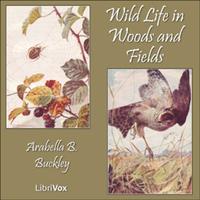THE SKYLARK AND HER ENEMY
THERE are a great many larks near our home. They sing so gaily in the morning as we go to school. But they sing much earlier than that.
We wanted once to try if we could get up before the lark. So we agreed to meet at five o'clock in the morning, in the meadow where one has been singing all this year. We heard him before we got out of the lane. There he was, rising up into the air, going a little to the right, and then a little to the left, rising and singing all the time, as if he wanted to wake all the world with joy.
We watched him till he was quite a tiny speck in the sky. The he came down again. When he was only a few feet from the ground he shut his wings and dropped into the grass.
The next morning we went at four o'clock. That lark was not singing, but one in the next field was rising up as gay as a lark could be. Then our mothers said we must not get up any earlier. So we could not rise before the larks.
We caught a lark once to look at it, and then let it fly away again. It is not a gay bird. It has brown wings marked with dark streaks. Its breast and throat are a dull white, dotted with brown spots, and it has a white streak above its eye. Its feet are curious. The toes lie flat on the ground, and the hind toe has a very long claw. If you watch a lark you will see that he runs, he does not hop. Neither does he perch in the trees, and only sometimes on a low bush. He lives on the ground, except when he rises up to sing.
In the winter, as we go to school, we see large flocks of larks in the fields, looking for insects, and seeds of wheat and oats. When we come near them, they get up, a few at a time, and fly away a little further. Then they wheel round and settle down to feed.
In the winter they scarcely ever sing. It is in the spring, when they pair, that they sing so beautifully.
About March we can often find a lark's nest hidden in the grass. They build in a rut, or a little hollow in the ground, often in the middle of the field. They line the nest with dry grass, and lay four or five eggs in it. The eggs are a dirty grey colour with brown spots on them, and they lie very snugly in the thick tufts of grass.
When the lark comes down after singing he does not drop close to the nest but a little way off. The he runs up to the nest through the grass. This is because he is afraid that the sparrow-hawk might see the nest, and pounce on the little ones.
The sparrow-hawk is the lark's great enemy. One day we were looking at lark rising up, and all at once we saw a sparrow-hawk just going to pounce upon it. The lark saw him too, and darted up faster than the hawk could soar. Then the hawk flew away a little and hovered about till the lark was tired and was obliged to come down. Then once more the hawk tried to pounce. But the lark was too clever for him. He closed his wings and dropped right down into the thick grass, and the hawk could not find him. We were glad the little lark was safe, and got back to his wife and little ones.

